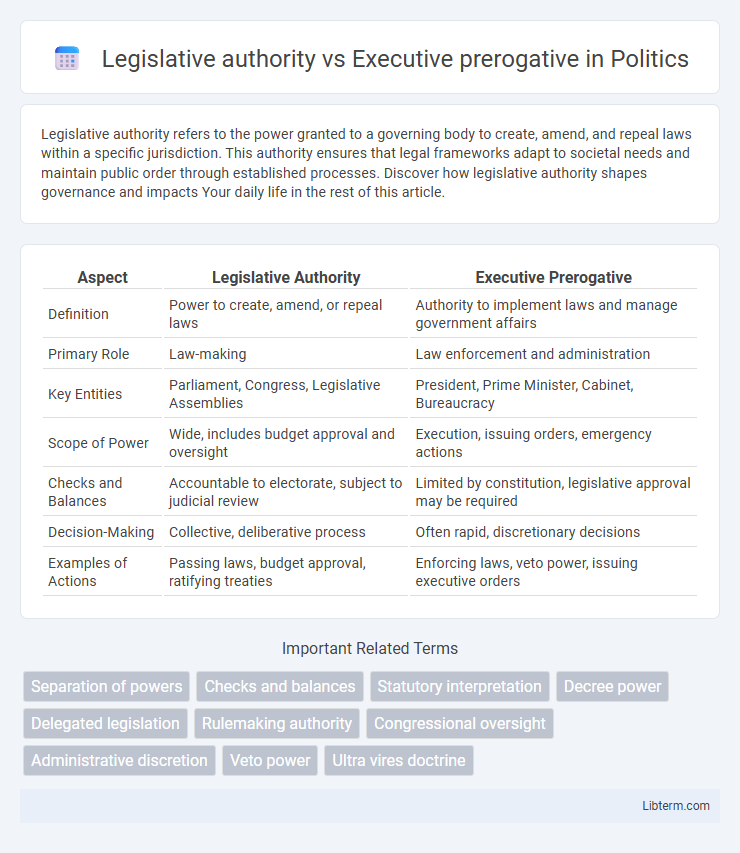Legislative authority refers to the power granted to a governing body to create, amend, and repeal laws within a specific jurisdiction. This authority ensures that legal frameworks adapt to societal needs and maintain public order through established processes. Discover how legislative authority shapes governance and impacts Your daily life in the rest of this article.
Table of Comparison
| Aspect | Legislative Authority | Executive Prerogative |
|---|---|---|
| Definition | Power to create, amend, or repeal laws | Authority to implement laws and manage government affairs |
| Primary Role | Law-making | Law enforcement and administration |
| Key Entities | Parliament, Congress, Legislative Assemblies | President, Prime Minister, Cabinet, Bureaucracy |
| Scope of Power | Wide, includes budget approval and oversight | Execution, issuing orders, emergency actions |
| Checks and Balances | Accountable to electorate, subject to judicial review | Limited by constitution, legislative approval may be required |
| Decision-Making | Collective, deliberative process | Often rapid, discretionary decisions |
| Examples of Actions | Passing laws, budget approval, ratifying treaties | Enforcing laws, veto power, issuing executive orders |
Defining Legislative Authority
Legislative authority refers to the constitutional power vested in a legislative body, such as a parliament or congress, to enact, amend, and repeal laws that govern a state or organization. It involves the formal process of lawmaking, including debating proposals, voting on statutes, and overseeing the implementation of legal frameworks. Legislative authority is distinct from executive prerogative, which encompasses the discretionary powers held by the executive branch to enforce laws and manage public administration.
Understanding Executive Prerogative
Executive prerogative refers to the discretionary powers exercised by the executive branch, especially the head of state or government, to act without prior legislative approval in specific circumstances such as national security or foreign affairs. This authority enables swift decision-making in emergencies but remains subject to constitutional limits and judicial review to prevent abuse. Understanding executive prerogative is essential for balancing efficient governance with safeguarding democratic accountability and separation of powers.
Constitutional Foundations of Power
Legislative authority derives its constitutional foundation from the separation of powers doctrine, granting elected bodies the power to enact, amend, and repeal laws within a democratic framework. Executive prerogative rests on the constitutional mandate for the implementation and enforcement of laws, often including discretionary powers exercised by the executive branch in areas such as national security and foreign policy. The balance between legislative authority and executive prerogative is essential for maintaining checks and balances, ensuring that no single branch exceeds its constitutionally defined limits of power.
Separation of Powers: Theory and Practice
Legislative authority involves the creation and enactment of laws by a representative body, while executive prerogative refers to the discretionary powers exercised by the executive branch, often in urgent or exceptional circumstances. The theory of Separation of Powers advocates for clear boundaries among legislative, executive, and judicial functions to prevent concentration of power and safeguard democratic governance. In practice, overlapping responsibilities and executive discretion can challenge this separation, leading to debates on constitutional limits and checks and balances.
Legislative Authority: Key Functions and Limitations
Legislative authority primarily involves the power to create, amend, and repeal laws that govern society, ensuring the legal framework reflects public needs and values. Key functions include debating policies, approving budgets, and overseeing government actions to maintain accountability and transparency. Limitations arise from constitutional boundaries, judicial review, and the need for executive cooperation to implement enacted laws effectively.
Executive Prerogative: Scope and Boundaries
Executive prerogative refers to the discretionary powers exercised by the executive branch, especially the head of state or government, within the framework set by constitutional and legal boundaries. Its scope includes decisions on national security, foreign affairs, and emergencies where swift action is required, often without prior legislative approval. While traditionally broad, executive prerogative is increasingly subject to judicial review and legislative oversight to prevent abuse and ensure accountability.
Checks and Balances in Democratic Governance
Legislative authority enacts laws, shaping public policy through elected representatives, while executive prerogative allows the head of state or government to implement and enforce these laws. Checks and balances in democratic governance ensure that legislative bodies monitor executive actions to prevent abuse of power, such as through budget approvals and legislative oversight committees. Executive prerogative is constrained by constitutional provisions and judicial review, maintaining a balance that upholds accountability and prevents authoritarian rule.
Historical Conflicts: Case Studies
Legislative authority and executive prerogative have historically clashed in landmark cases such as the English Bill of Rights (1689), where Parliament curtailed royal prerogatives to assert legislative supremacy. The U.S. case of Youngstown Sheet & Tube Co. v. Sawyer (1952) exemplifies judicial checks on executive overreach during national emergencies, affirming Congress's legislative power limits. Conflicts in colonial India between British governors exercising executive prerogative and legislative councils highlight the tension between administrative control and representative lawmaking.
Contemporary Challenges in Power Distribution
Legislative authority faces contemporary challenges in balancing its law-making powers with the executive prerogative, which often involves discretion in policy implementation and emergency decisions. Conflicts arise when executives expand prerogative powers, potentially undermining legislative oversight and democratic accountability. The tension intensifies in crisis situations, where rapid executive action may bypass legislative procedures, raising debates about the limits and checks on executive dominance.
Ensuring Accountability and Transparency
Legislative authority ensures accountability and transparency by enacting laws, conducting oversight, and scrutinizing executive actions through hearings and investigations. Executive prerogative permits swift decision-making in emergencies but requires checks, such as legislative approval and judicial review, to prevent overreach. Effective governance balances these powers by promoting transparency through public reporting and adherence to legal frameworks.
Legislative authority Infographic

 libterm.com
libterm.com